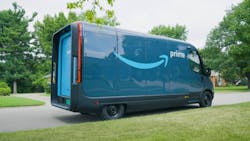Federal Agencies quadrupling EV adoption, Private Sector making E-Mobility commitments
Federal agencies have quadrupled their acquisition of zero emissions vehicles during this fiscal year and plan to install an additional 24,000 charging stations at U.S. government sites before the period is over.
The Biden Administration announced this acceleration of e-mobility goals Thursday while also highlighting its Charge@Work program for public and private partnerships to expand access to and infrastructure supporting electric vehicle adoption. The White House pointed out a host of companies and advocacy efforts working to both promote EVs and make it easier to keep them charged at work.
President Biden has pushed and passed several pieces of high-profile legislation –including the Inflation Reduction Act and the Bipartisan Infrastructure Act—aimed at increasing fleet electrification and reducing carbon emissions in the transportation. His goal is to have 50 percent of vehicle sales be electric by 2030.
To that end, the White House also revealed that federal agencies already have bought about 13,000 new zero emission vehicles (battery electric or fuel cell) during fiscal year 2023, compared with 4,000 last year. Those federal sites also plan to install about 24,000 charging stations, bringing the total to nearly 30,000.
With more Connected Grid Assets come Cybersecurity dangers: Check our webinar with Dragos
The White House spotlighted numerous companies, public agencies and industry support groups as advancing the e-mobility cause dramatically in the past year. Among those named Thursday included bus services firm First Student, battery technology Cirba Solutions, autonomous driving tech firm Waymo, online retail giant Amazon and HVAC-climate control solutions firm Trane Technologies.
Each of these have make substantial commitments to scaling up fleet electrification and EV expansion. First Student, for instance, says it will transition 30,000 fossil-fueled school buses to electric by 2035, while Cirba Solutions recently announced a battery recycling plant in the U.S. and commitment to use those materials to equip one million EVs by 2028.
Amazon plans to roll out more than 3,000 electric delivery vehicles soon on the way to 100,000 EVs by 2030.
Trane Technologies is planning to transition all of its global fleet of more than 8,000 vehicles to all-electric by 2030.
Real estate developer Prologis is committing to make every new housing and building development charging-ready and also shift its maintenance vehicle fleet to 100 percent alternative fuel vehicles by 2030.
About the Author
EnergyTech Staff
Rod Walton is head of content for EnergyTech.com. He has spent 17 years covering the energy industry as a newspaper and trade journalist.
Walton formerly was energy writer and business editor at the Tulsa World. Later, he spent six years covering the electricity power sector for Pennwell and Clarion Events. He joined Endeavor and EnergyTech in November 2021.
He can be reached at [email protected].
EnergyTech is focused on the mission critical and large-scale energy users and their sustainability and resiliency goals. These include the commercial and industrial sectors, as well as the military, universities, data centers and microgrids.
Many large-scale energy users such as Fortune 500 companies, and mission-critical users such as military bases, universities, healthcare facilities, public safety and data centers, shifting their energy priorities to reach net-zero carbon goals within the coming decades. These include plans for renewable energy power purchase agreements, but also on-site resiliency projects such as microgrids, combined heat and power, rooftop solar, energy storage, digitalization and building efficiency upgrades.
